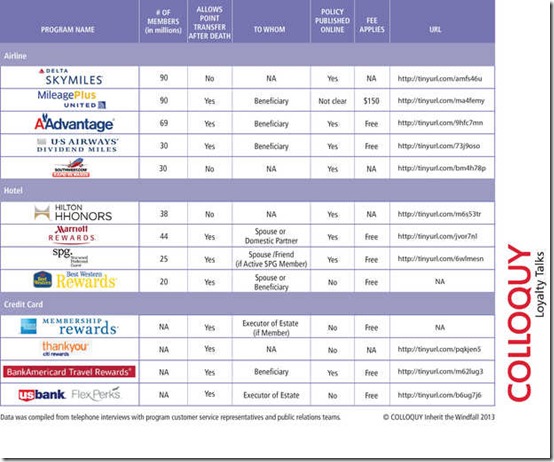So what happens to your loyalty points and miles when you die?
The answer depends on the loyalty program.
Your Delta Skymiles frequent flyer account may have over one million miles when you die, and those miles are as dead as you. If you die with one million United Mileage Plus miles, then your spouse, upon paying a $150 transfer fee, may become a jetsetter after you are gone. Starwood even allows SPG points to be transferred to a friend upon death if that person is an active SPG member.
You know it is big news when loyalty points and miles are covered in stories on CNBC and major network news. That is what happened this week after Colloquy, a magazine for the global loyalty marketing industry, published its report “Inherit the Windfall: Passing on Loyalty Points”.
Colloquy estimates there were about $50 billion in outstanding loyalty points (2011) and loyalty program membership increased 26% in the past two years. Colloquy estimates there are 2.65 billion memberships worldwide in loyalty programs.
Consumers view loyalty program points and miles as financial assets.
Why not?
For the consumer, the loyalty program points and miles have real value in terms of cash savings when staying at a hotel on points, flying on award tickets, or even getting that free sandwich at Subway or coffee at Starbucks or 10 cents off a gallon of gas using Safeway gas credit points.
Colloquy’s survey of consumers found 76% of loyalty program members have never considered what happens to their loyalty points and miles upon death.
So what happens to your loyalty points and miles when you die?
Source: Colloquy Inherit the Windfall 2013
Boarding Area founder Randy Petersen is sitting on more than 20 million points and miles. This CNBC article quotes him as stating his wife has all his account passwords and she is named in his will as the recipient of his points and miles.
Loyalty Program Terms and Conditions regarding loyalty points transfer after death of member are often not stated online.
Colloquy examined the terms and conditions among loyalty programs regarding transfer of points and miles upon the death of a member. Their findings reveal that hotel loyalty programs do not have consistent policies regarding the transfer of points and miles after death, and loyalty program terms available online often do not define the policy.
This meant surviving spouses and relatives dealing with loyalty program customer service agents who did not necessarily provide accurate advice on how to claim a deceased spouse’s loyalty points.
Apparently it is not uncommon for a surviving spouse or relative to continue using their deceased member’s points and miles after death for their own awards. Obviously that is a strategy for the surviving relatives of Delta, Southwest and Hilton members who die since these loyalty programs do not allow transfer of points and miles upon death.
Colloquy encourages the industry to be forward thinking about death.
The good news is this Colloquy industry report encourages loyalty programs to establish consistent policies regarding the transfer of miles and points upon death. The other good sign is the report encourages loyalty programs to allow the free transfer of points and miles upon death to create better customer satisfaction.
Seriously, how likely would you be to fly Delta or stay at Hilton hotels after learning all the miles and points in your spouse’s account expired along with your spouse?
And you could have had all those points transferred to your own account if your spouse had been staying at Starwood Hotels and flying American Airlines during the heavy business travel years.
Here are Colloquy’s suggestions to the loyalty program industry:
To strengthen member relationships regarding the issue of point transfer, marketers or loyalty program operators should consider:
• A clear, transparent policy. It should list all terms and conditions and provide a check- list of needed documents. Ideally, members could access these terms online without having to call customer service, saving them a chore during the grieving period.
• The transfer fee. Each company must make this decision based on financial viability, but it may cause a negative customer reaction. Participants may resent having to pay even a small fee to keep the points they believe their deceased loved ones earned fairly for being loyal customers. A gesture like waiv- ing the transfer fee can have a significant positive impact on the relationship with the surviving customer.
• The work-around. Some customers try to avoid fees by accessing the accounts with the decedents’ passwords or other surreptitious methods. Instead of prohibiting point transfers and driving this behavior, market- ers should reward those who honestly report the collector’s death by offering a more flexible and generous policy.
• Being proactive. Anticipate customers’ needs by offering education and advice. Identify members with large amounts of accrued points who might wish to will their points. Help them understand the transfer process in the event of their death.
Looks like I need to examine this issue more closely to see how other hotel loyalty programs like Hyatt Gold Passport, IHG Rewards Club and Club Carlson handle death transfers.
*****
Ric Garrido of Monterey, California is writer and owner of Loyalty Traveler.
Loyalty Traveler shares news and views on hotels, hotel loyalty programs and vacation destinations for frequent guests. Check out my page of collated current hotel promotions.
Follow Loyalty Traveler on Twitter and Facebook and RSS feed or subscribe to a daily email newsletter of Loyalty Traveler blog posts on the upper left side of this page.




1 Comment
Comments are closed.